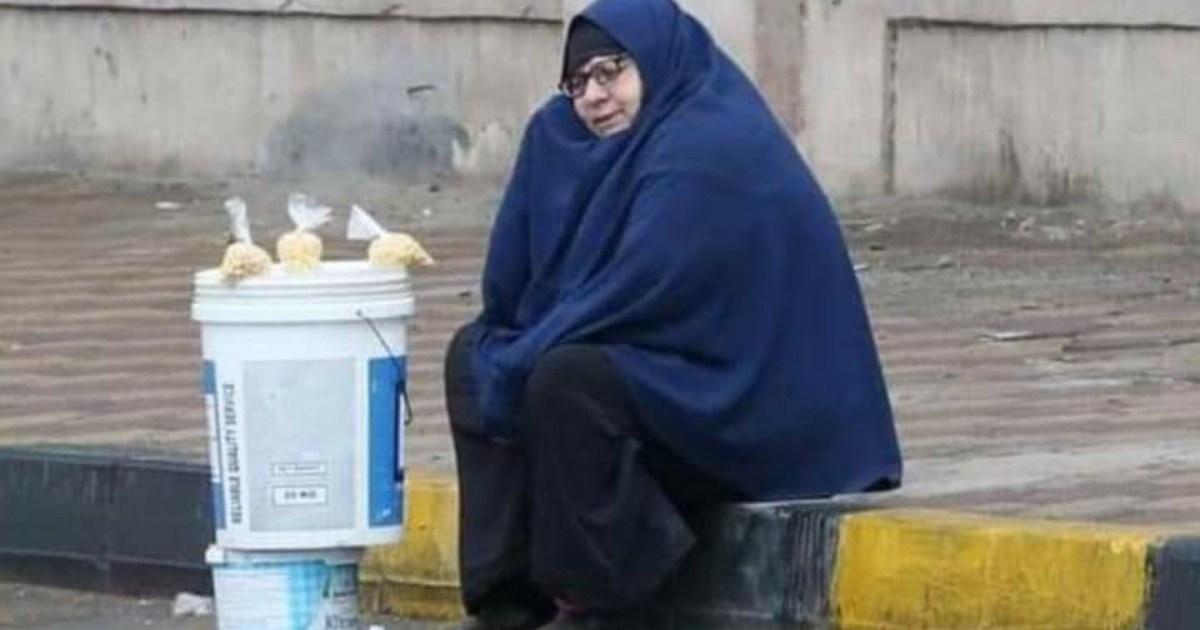The image of an Egyptian woman selling lupine pills in a harsh rainy atmosphere in Cairo met with wide interaction on social media sites, prompting various parties to support her financially and morally.
Nemat Abdul Hamid became known as "The Lady of the Rain", after the circulation of her image, which aroused widespread sympathy for what appeared of her suffering, while she was waiting to sell a number of thermos bags mixed with rain water.
The woman did not gain much of that, but the widespread circulation of her image helped fulfill her simple dreams of providing medicine and an apartment in a few hours, so she got her livelihood twice, according to two tweeters.
I always try to see the positive part of every misunderstanding.
I am happy that I got to know Hajja Nemat Abdel Hamid # Lady_Matar from the social media, and I communicated
with
Hajjah
Nemat and Hajj Ali her husband.
I am honored that I have all the requests needed by her family.
Every single thing cures a sweet thing ❤️ pic.twitter.com/xQLFumvKTa
- Yasmine Sabri (@yasminesabri) November 20, 2020
On Saturday, the Ministry of Solidarity said in a series of tweets on Twitter that the woman was called Neamat Abdel Hamid, 63, and suffers from poor financial and health conditions, which prompted her to sell a "thermos" (one of the famous amusement parks in Egypt) on the streets of Cairo to meet her needs.
The ministry indicated that its image was spread (Friday) on communication platforms during the period of bad weather in a Cairo street.
The ministry directed the provision of a housing unit and financial aid, while considering providing a pension (monthly financial dues) and providing medicines for it.
Through his widespread program in Egypt, the journalist Amr Adeeb raised the issue of "Our Lady of the Rain" on Friday evening, with the Minister of Solidarity Nevin Al-Kabbaj, who confirmed the provision of such aid.
The image of "Our Lady of the Rain" not only attracted the attention of the Ministry of Solidarity and Information, but also pushed accounts on communication platforms to compare it with another image of the Egyptian artist Yasmine Sabry inside one of the planes, before the latter announced the provision of assistance to her.
The Minister of Social Solidarity directed, in coordination with the Giza Governorate, to provide a new rental housing unit and to provide financial assistance to Mrs. Naamat.
The Minister of Social Solidarity directed a team of homeless children and adults to communicate with the woman who traded her photo during the bad weather period (1) pic.twitter.com/k9yMUTE2Z9
- Ministry of Social Solidarity (@MOSS_Egypt) November 21, 2020
Sabri tweeted, "I am happy that I got to know El Hajja Nemat Abdel Hamid, the lady of the rain, from Social Media, and I contacted her."
She added, through her verified Twitter account, "I am honored to fulfill all the requests of Hajjah Naamat and her family," without details.
The pioneers of social networking sites interacted with the image of Mrs. Naamat, and Egyptians saw that the image reflects the condition of a large segment of citizens.
The pioneers of social networking sites expressed their admiration for the Egyptian media's dealings with the image of Mrs. Naamat, and its celebration of her without looking at other similar citizens, considering it an anomaly.
Very great interaction that happened with the image of #Mister_Rain
, everyone is able to help even a little;
Go down the street, turn to those who need help, and they will not ask for a turn
in the eyes of the people for a door of mercy. Extend your hands and
help
them.
People help them, and people support people. # Matt_Umar pic.twitter.com/A7eLtD3ScY
- Ahmed Samir Ahmad Samir (@ A_SAMIR_1) November 21, 2020
Tweeters called for sponsoring those in need in Egypt and providing real job opportunities for them, and working on establishing social justice rules instead of exporting only one model.
In 2019, the Central Bureau of Statistics (official) revealed that the poverty rate in Egypt is 32.5%, compared to 27.8% in 2015, an increase of 4.7%, according to Anadolu Agency.

